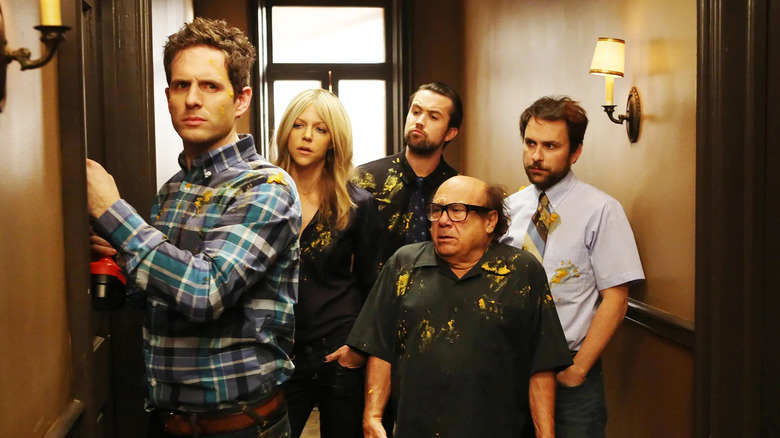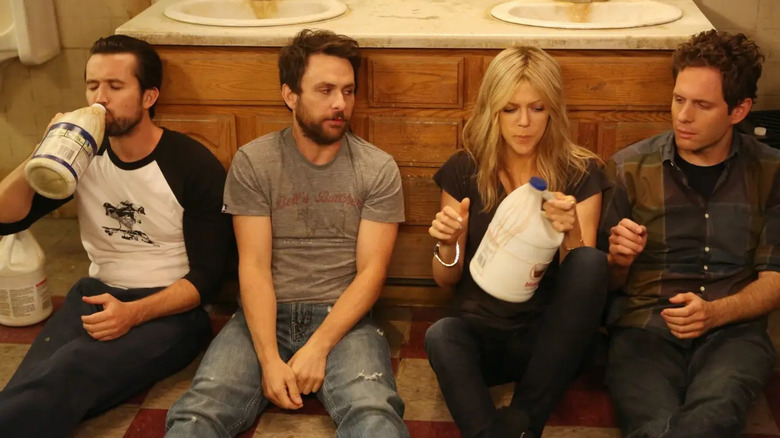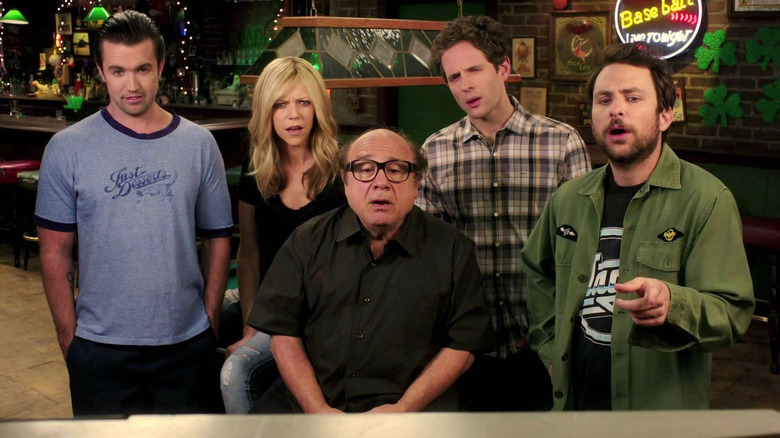How It's Always Sunny In Philadelphia Tells Cruel Stories Without Becoming Cruel Itself
"It's Always Sunny in Philadelphia" is known for tackling controversial topics in its pursuit of laughs, but never to the point of becoming cruel itself. The despicable gang's antics create the show's vulgar comedy while (mostly) avoiding offending audiences. The cast and crew have managed to maintain that balancing act on the longest-running live-action sitcom for years, rarely diving into a subject that they are not prepared to handle responsibly as social norms evolve.
Toeing that line is no easy task — in fact, series showrunner and star Rob McElhenney (who plays Mac) has talked about what makes "Always Sunny" a tricky comedy to pull off, admitting that the show's strong (and intentionally simple) foundation has been vital to its success. Making fun of bad people has been the show's primary goal since the first episode. A recipe for success, it's not often that "Always Sunny" struggles to follow its own rules, but when it does, the creative team does not hesitate to make amends.
Creating comedy out of pitiful people
Speaking to Rolling Stone, McElhenney acknowledges that starting the series with the characters at their most idiotic has benefited them in the long run. The actor states that "Just by function of the design, of the storytelling and the characters themselves, [most shows] have to start following those emotional evolutions, which we just don't have to do." What McElhenney describes can be considered a perk of being a sitcom, but it's especially beneficial for a show with such immoral protagonists.
Above all, it allows the creators to make fun of how people can be so outwardly cruel and bigoted without having any sort of redemption in the cards. McElhenney goes further into detail, explaining:
"I get this question a lot, too: 'Are you guys afraid of tackling any subject, or are there certain places you won't go?' Because we do seem to get away with a lot that on the surface it seems people are not able to get away with now. And I think there's a key distinction in what we're doing, and ultimately our fans recognize [it], in terms of satirizing certain behavior. We're certainly not lauding characters for their homophobia or misogyny or casual racism ... we're degrading our own characters for holding some of those views."
In other words, the joke isn't the offensive content itself, but the terrible characters and their out-of-touch beliefs.
Righting some unfunny wrongs
Although McElhenney's sentiment holds true for the majority of "It's Always Sunny in Philadelphia," some of its raunchier jokes have not aged particularly well. Rarely, the series has gone overboard in showcasing the gang's bigotry in "Always Sunny." For instance, there are several early episodes that have been pulled from its streaming home, Hulu, because they include characters acting out racial stereotypes. McElhenney recognizes how offensive those gags are now:
"Our intentions are never to be cruel, to be dismissive, to be mean or negative or anything like that ... And there are certain times, certain terminology we were using, that we didn't realize at the time was derogatory or inflammatory, in a way that made us seem like bullies as a television series ... Those are the kinds of wrongs we try to right retroactively."
Obviously, the offensive content itself was never the joke — but, as McElhenney points out, "Whether or not that was the intent is irrelevant to the person who is sitting there watching it and saying, 'Oh, my favorite TV show is making fun of me.'"
As a fan, it's always nice to hear creators acknowledging past mistakes and expressing a willingness to learn from them. The self-serving nature of the show's protagonists is a part of what makes "It's Always Sunny in Philadelphia" so entertaining, and despite some missteps, the show's writers continue to create hilarious, unbelievable situations for its gang. To this day, "It's Always Sunny in Philadelphia" pushes the envelope and tackles tough topics in a smart, hilarious manner, while navigating the constantly evolving social ethics of our day.


